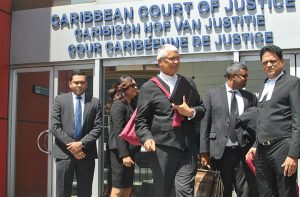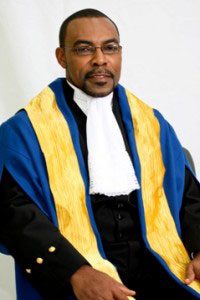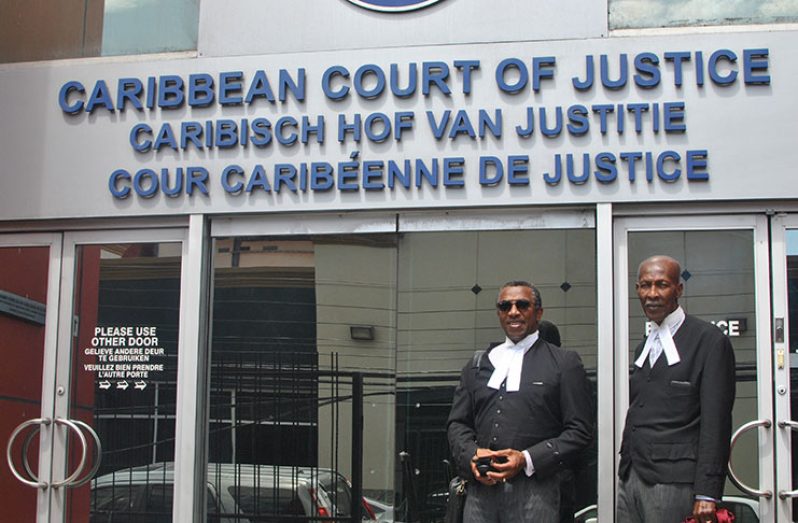…Judges question level of consultation during process
By Svetlana Marshall in Port of Spain
MEANINGFUL consultation between the President and the Opposition Leader could have prevented the legal dispute on the appointment of Justice (Retired) James Patterson as the Chairman of the Guyana Elections Commission (GECOM), Judges of the Caribbean Court of Justice (CCJ) asserted when oral arguments in the case – Zulfikar Mustapha vs the Attorney General – were heard.
Mustapha, Executive Secretary of the People’s Progressive Party (PPP) turned to the CCJ to challenge President David Granger’s decision to appoint Justice Patterson as Chairman of GECOM, after losing the challenge in both the High Court and Court of Appeal.
On Wednesday, during approximately three hours of legal arguments at the Trinidad-based CCJ, Justice Jacob Wit, while underscoring the importance of proper consultation, said
“presidents should not be in court, they should govern.”
Justice Wit was part of a panel of five judges led by President of the CCJ, Justice Adrian Saunders that presided over the constitutional case. The other judges were Justice David Hayton, Justice Winston Anderson and Justice Rajnauth-Lee.
Weighing in on the issue of meaningful or proper consultation, Justice Anderson said he feels a degree of disquiet with the CCJ having to decide on such issues.
“It seems to me that, as my brother just said, to avoid all of this, and I think it is desirable to avoid all of this, that there should be ‘meaningful consultation’, so that the two political leaders in the country arrive at a decision that both can live with, and I think it is a tragedy, to be honest, that we are here in this way,” Justice Anderson said.

Article 161(2) of the Constitution outlines the criteria for appointing a GECOM chairman. A section of that article states, “… the Chairman of the Elections Commission for Guyana shall be a person who holds or who has held office as a judge of a court having unlimited jurisdiction in civil and criminal matters in some part of the Commonwealth or a court having jurisdiction in appeals from any such court or who is qualified to be appointed as any such judge, or any fit and proper person, to be appointed by the President from a list of six persons, not unacceptable to the President, submitted by the Leader of the Opposition after meaningful consultation with the non-governmental political parties represented in the National Assembly.”
In October 2017, President Granger swore in Justice Patterson as Chairman of GECOM after rejecting three lists of nominees totaling 18 names submitted by the Opposition Leader Bharrat Jagdeo on the grounds that they were unacceptable within the meaning of the Constitution of Guyana. Faced with three unacceptable lists, the President resorted to the proviso found within Article 161 (2), which permits him to independently appoint a chairman.
Both the High Court and the Court of Appeal had indicated that the President and the Leader of the Opposition ought to have consulted on the nominees prior to the compilation and submission of the list. Similar sentiments were expressed by the CCJ judges on Wednesday.
“I wouldn’t have thought that anybody wants the court to be the ultimate decider or to get too intrusive in the process. And hopefully with the kind of guidelines which might be given, the two leaders can in fact agree so we don’t have this kind of task before us,” Justice Anderson posited while Mustapha’s lead attorney, Douglas Mendes was presenting his arguments.
Mustapha was also represented by Attorneys-at-Law Anil Nandlall, Chandrapratest Satram, Kandace Bharath, and Davesh Maharaj.
The Attorney General, Basil Williams – the respondent in the matter, appeared on behalf of himself in association with Queen’s Counsel Ralph Thorne and Hal Gollop, and the Solicitor General, Nigel Hawke.
Mendes, Trinidad-based Attorney-at-Law, told the Court that Article 161 (2) is intended to achieve the appointment of a chairman that is acceptable to both the President and the Leader of the Opposition.
He said while the Constitution lays out the criteria for one to be eligible, it does not define what is acceptable, as such, consultation ought to have taken place prior to determine who is not unacceptable to the President. Mendes said otherwise, it would be a guessing game.
“You would not know unless you are able to have a conversation with the President. Unless the President is open and transparent about what he is thinking, it may very well be as the Constitution is envisaging the holders of these two high offices will sit and discuss names,” Mendes submitted.
According to him, though not expressly stated in the Constitution, such a consultation is implicitly required by it. “There is no way it can work, other than as a consequence of consultation between the President and the Leader of the Opposition,” he submitted.
With three sets of six names submitted to the President, Mendes said from the initial list, the President should have indicated whether the entire list or one person among the six was unacceptable.
Interjecting, Justice Saunders noted that while acceptability is subjective, it must be conditioned on objective grounds. Mendes said while the President may find a list unacceptable, he should have given reason to allow for an acceptable list to be submitted.
But Barbadian Queen’s Counsel Ralph Thorne told the Court that he did not find favour with the view that the President and the Opposition Leader ought to have consulted on the names of the nominees prior to the submission of the first six names. Using Article 161 (2) as the basis of his argument, Queen’s Counsel Thorne said the Constitution only mandated that there be consultation between the Leader of the Opposition and non-governmental political parties represented in the National Assembly. “There is nothing in the Constitution that mandates the President to enter into dialogue with the Leader of the Opposition,” he said.

The Queen’s Counsel told the court that while it was not a constitutional requirement for the two political leaders to consult on the list of nominees, President Granger, having found that the first list of nominees was unacceptable in January 2017, presented the Opposition Leader with some criteria, during what could be described as a period of consultation.
In May, 2017, President Granger laid out the criteria for the position, among them being that the person must have no political affiliation and that the person should have the general characteristics of honesty, integrity, faithfulness, and diligence.
But Justice Anderson and Justice Saunders questioned the logic and purpose of having dialogue or consultation after the first list was submitted. In response, the Barbadian Queen’s Counsel said consultation, as was done, could take place between the President and the Opposition, if the list is found to be unacceptable.
Added to that, he said while it was suggested that the list presented to the President ought to have been acceptable to both him and the Opposition Leader; that is not the case. According to the Queen’s Counsel, the suggestion contradicts the Constitution.
“Article 161 (2) places the question of acceptability solely within the bosom of the president,” he submitted. The Barbadian Queen’s Counsel held fast to the position that while the Opposition Leader was constitutionally required to submit a list comprising six eligible persons, only the President could have determined the acceptability of the list or the nominees.
No mandate to give reason
Gollop, another Barbadian Queen’s Counsel told the court that the Constitution does not mandate the President to give reason for rejecting a list of nominees submitted by the opposition leader. After three unsuccessful rounds, Gollop told the Court that the President, in keeping with the Constitution, activated the proviso.
Interjecting, Justice Saunders drew Gollop’s attention to the fact that the Constitution was amended to allow for consensus in the appointment of the GECOM chairman. “There was a provision that entitled the President to select a chairman of the commission in his own deliberate judgement, and then there was a big procedure that said this is not ideal, we want to move from unilateralism to a situation where there is consensus. An amendment was done, that amendment sets out a process that seeks to achieve this aim towards consensus but if we are to accept your submissions now, then all of that amendment and discussion that went into the amendment would be in vain,” Justice Saunders reasoned.
But Gollop respectfully rejected Justice Saunders’ position. The Queen Counsel said the President did not only reject the first list but provided the Opposition Leader with criteria so as to arrive at an acceptable list as a form of consultation.



.jpg)








